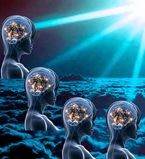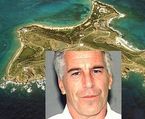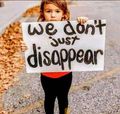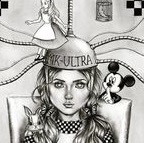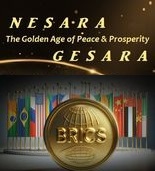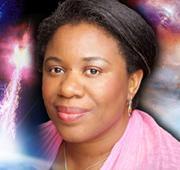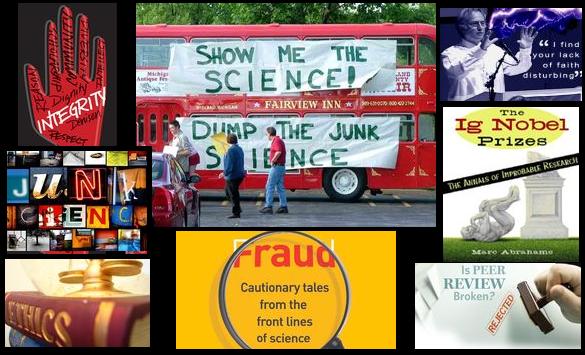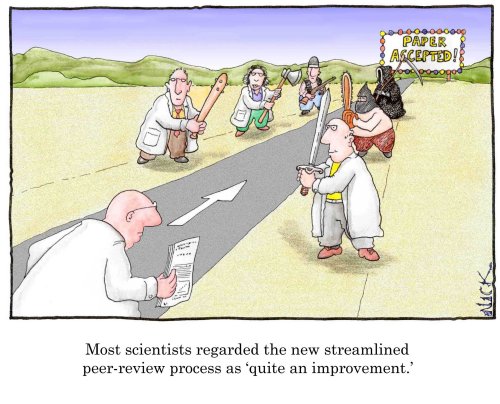Nobel winner declares boycott of top science journals
Randy Schekman says his lab will no longer send papers to Nature, Cell and Science as they distort scientific process
Guardian, 9th December 2013

Leading academic journals are distorting the scientific process and represent a "tyranny" that must be broken, according to a Nobel prize winner who has declared a boycott on the publications.
Randy Schekman, a US biologist who won the Nobel prize in physiology or medicine this year and receives his prize in Stockholm on Tuesday, said his lab would no longer send research papers to the top-tier journals, Nature, Cell and Science.
Schekman said pressure to publish in "luxury" journals encouraged researchers to cut corners and pursue trendy fields of science instead of doing more important work. The problem was exacerbated, he said, by editors who were not active scientists but professionals who favoured studies that were likely to make a splash. [...]
Schekman criticises Nature, Cell and Science for artificially restricting the number of papers they accept, a policy he says stokes demand "like fashion designers who create limited-edition handbags." He also attacks a widespread metric called an "impact factor", used by many top-tier journals in their marketing.
A journal's impact factor is a measure of how often its papers are cited, and is used as a proxy for quality. But Schekman said it was "toxic influence" on science that "introduced a distortion". He writes: "A paper can become highly cited because it is good science - or because it is eye-catching, provocative, or wrong."
Comment: Wow.... I have cited many articles about the corrupt peer review process that perpetuates the status quo and keeps out science that controllers do not want known. What this means is there are many people who only believe what is fashionable and have basically lost any ability to judge merits based on working things out from first principles. These people who only believe what they are told and can't think for themselves are often ignorant and arrogant. Generally they cause problems for genuine thinkers, philosophers and scientists who realise what the spirit of scientific enquiry is all about. Over the last few years, many more real scientists have got really fed up with the sheep culture and are starting to stand up and rebel... Courtesy: The image icon was taken from redicecreations.com. Thanks.
The Mind of a Con Man
New York Times, 28th April 2013
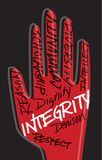
[...] Each case of research fraud that’s uncovered triggers a similar response from scientists. First disbelief, then anger, then a tendency to dismiss the perpetrator as one rotten egg in an otherwise-honest enterprise. But the scientific misconduct that has come to light in recent years suggests at the very least that the number of bad actors in science isn’t as insignificant as many would like to believe. And considered from a more cynical point of view, figures like Hwang and Hauser are not outliers so much as one end on a continuum of dishonest behaviors that extend from the cherry-picking of data to fit a chosen hypothesis — which many researchers admit is commonplace — to outright fabrication. Still, the nature and scale of Stapel’s fraud sets him apart from most other cheating academics. “The extent to which I did it, the longevity of it, makes it extreme,” he told me. “Because it is not one paper or 10 but many more.”
Comment: What I can't understand is that these kind of studies are supposed to be reproducible... Why should his research be automatically believed? Instead, Diederik Stapel's fantasy studies just made him famous.... This academic fail is truly pathetic... Whatever, if you have studied narcissism, this article implies Stapel hits the top of the scale and that makes him a psychopath. This means that it is not possible for him to feel any genuine remorse... Just read the article, I simply can't believe that this person is not completely warped... In my opinion it reveals just how much society loves lies and there are so very few willing to discern truth, most prefer to be entertained with fantastic lies or look the other way when the lies are undeniable.
Professor Higgs speaks out against the name 'God particle'
Yahoo News, 9th April 2013

It may have been hailed as the Holy Grail of physics - but nicknaming the Higgs boson the “God Particle” has proved equally controversial.
The latest outburst against the term was by Professor Peter Higgs himself – the British physicist who suggested the particle's existence.
Higgs's comments come as scientists close in on final proof of the particle's existence at the Large Hadron Collider - ending a 40-year, £8.6 billion quest.
The 83-year-old, who came up with the theory while walking in the Cairngorms in 1964, said calling the Higgs boson “the God particle” was “misleading”.
Comment: I notice that we are given the opinion of Br. Guy Consolmagno, the Vatican astronomer and general mouthpiece on religious matters, the Guy does get around a bit doesn't he... Well, Guy is another Jesuit who delights in telling us about 'myth'. To elucidate this man's mindset, I am delighted to offer the following gem from one of his books.
“What’s worse, for every serious book of science in a bookstore,
there’s a whole shelf of astrology and UFO nonsense also promising
to give you the “secret knowledge” of the universe. In religion, we call
this lust for secret knowledge “gnosticism.” Science has its gnostics,
too. Indeed, the New Age is the place today where bad religion meets
bad science.
But in the popular culture, the place where most of us learn about
science or religion—especially traditions or fields different from our
own experience—are in stories. All modern fiction makes assumptions
about science and religion. A good mystery, for instance, can
depend on the physical possibility of certain events (science) and the
ethics of the characters involved (religion). Science fiction is very
explicit in making these concepts central to its story.
Stories, myths, and tales have always made ideas a part of popular
culture. Great religious figures teach us with parables. Fables and fairy
tales are the way we teach our children about life. And even the
ancient Greek myths, it has been argued, might have been deliberate
devices for organizing and transmitting information about the natural
world to nonscientific people.
Once an idea gets turned into a story, people pay attention long
enough to listen. They feel comfortable evaluating it, by comparing
the story against their own lives. And they remember it. The images
from Dante are much more vivid than the arguments of Aquinas.
So what do our stories tell us about science and religion? One
message all too present is that both are to be feared, each in its own
way. In the movies, all preachers are power-hungry, money-driven
hypocrites; all scientists are mad. They’re both caricatured by wild
hair and a fanatical gleam in the eye.”
Source: BROTHER ASTRONOMER: ADVENTURES OF A VATICAN SCIENTIST (2000) pg 87
Brother Guy makes some valid points about New Agers and scientists, but in reality, this is most certainly a case of the pot calling the kettle black... What a joke, 'Pious Fraud' or the mentality 'the end justifies the means' is a main stay for Roman Catholicism, the same for many who claim to be New Agers, it is one of the hallmarks that distinguishes a cult member... Whatever, I hope that soon I can find a few people who are SICK OF THE MYTHS AND MYTHMAKING AND ARE EVOLVED ENOUGH TO WANT TO MOVE ON...
JREF's Pigasus Awards “Honors” Dubious Peddlers of “Woo” (VIDEO)
James Randi, March 2013

Hollywood, CA. —The James Randi Educational Foundation (JREF) promotes critical thinking through grants for outstanding teachers, scholarships to inspire skeptical students, educational resources for the classroom and general public, and annual conferences showcasing the best of skeptical thought—but every April Fools’ Day, JREF “honors” the five worst offenders who are intentionally or unintentionally peddling harmful paranormal and pseudoscientific nonsense.
Since 1997, the JREF’s annual Pigasus Awards have been bestowed on the most deserving charlatans, swindlers, psychics, pseudo-scientists, and faith healers—and on their credulous promoters, too. The awards are named for both the mythical flying horse Pegasus of Greek mythology, and the highly improbable flying pig of popular cliché.
These are this year’s “winners.”
Comment: I have always viewed James Randi with suspicion as it is public knowledge that he was once a magician. Over the years, I have presumed that his missionary calling is to debunk anything that requires people to think outside of the mainstream mental rut. Anyway, I think these awards are highly amusing and indicate who are some of the most sucessful pushers of “woo”. Since I can't stand fog-horn Alex Jones, who I think is just another paid pied piper, I am quite pleased he has got another well deserved award. As those who are educated in these matters already know, mouthpieces/gurus/cult leaders operate by proclaiming A, B, C that is often quite truthful, but it is very likely that there will be an issues with D-Z that appear once believers are “hooked”. Followers are expected to believe everything is all true despite any doubts they might have and that is where the cognitive dissonance sets in for many.
‘What has gotten into Thomas Nagel?’: Leading atheist branded a ‘heretic’ for daring to question Darwinism
National Post, 13th March 2013

The philosopher Thomas Nagel is not taking phone calls.
His secretary at New York University says there have been hundreds, all wanting to reach the modern “heretic,” as a current magazine cover labels him, but he is not taking the bait.
All he did was argue in a new book the evolutionary view of nature is “false,” and now grand forces have descended upon him. He does not want to talk about it.
The vicious reception handed Mind & Cosmos, which urges deep skepticism about evolution’s explanatory power, illustrates the perils of raising arguments against intellectual orthodoxy.
One critique said if there were a philosophical Vatican, Prof. Nagel’s work should be on the index of banned books for the comfort it will give creationists. Another headline proclaimed Prof. Nagel is “not crazy.” [...]
Prof. Nagel’s thesis is provocative, no doubt.
In just 128 pages, Mind & Cosmos argues the modern scientific story of the origin of life through evolution is “ripe for displacement” and it represents “a heroic triumph of ideological theory over common sense,” which will be seen as “laughable” in a couple of generations”.
Comment: Hmmm... From what I have read, Nagel has decided to look at the evidence and has decided that being a high priest and religious fanatic for the Church of Atheism & Scientific Dogma does not work for him. Darwinism is a failed and outdated theory as there are too many holes for it to be tenable and all Nagel is doing is pointing out some reality... For example the mainstream media keeps providing those who are interested with examples of rapid evolutionary change in decades rather than hundreds of thousands of years, somatic hypermutation or the ability of species to adapt quickly to environmental disturbances is a fact. BUT we are also told that Nagel admits, “For a long time I have found the materialist account of how we and our fellow organisms came to exist hard to believe, including the standard version of how the evolutionary process works,” he writes in the book, which is subtitled “Why the Materialist Neo-Darwinian Conception of Nature is Almost Certainly False.” The weight of evidence is crushing the fanatics and zealots and some of them like Nagel are admitting defeat. So he states: ‘I realize that such doubts will strike many people as outrageous, but that is because almost everyone in our secular culture has been browbeaten’. Well, I have been listening to Rupert Sheldrake who claims what some claim is supernatural like telepathy is completely natural. Then strangely, the thought occurred to me: do animals believe in God? I think the atheism is a smoke screen and that the real issue is scientists being used to suppress the flowering of consciousness amongst humans... Quite frankly, despite the disapproval of many in the scientific community, this has not stopped 4% of the population developing synaesthesia... It seems, that quite naturally, there is a flowering of consciousness and people developing new abilities, despite the opposition and challenges from religious fanatics whatever their hue.
The search is on to find the faker behind Piltdown Man
The earliest known human, discovered in 1912, turned out to be an elaborate hoax. Now scientists believe they can track down the perpetrator, says Karolyn Shindler.
The Telegraph, 3rd December 2012
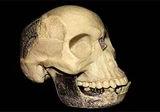
One hundred years ago, the world was introduced to Piltdown Man, seemingly one of the most remarkable discoveries of the age – which turned out to be perhaps the most audacious and brilliant fraud in scientific history. [...]
The discovery had been made by a Sussex solicitor and amateur antiquarian, Charles Dawson, who brought his finds to his friend Dr Arthur Smith Woodward, the Keeper of Geology at the Natural History Museum. Although Smith Woodward’s expertise was in fossil fish, he staked his – and the museum’s – reputation on the find, which he named in honour of his friend: the Dawn Man of Dawson, or Eoanthropus dawsoni. [...]
With the centenary of the “discovery” approaching, a group of scientists – known unofficially as the Piltdowners – recently decided that it is time finally to expose the forger. Led by Professor Chris Stringer, research leader in human origins at the Natural History Museum, the team is re-analysing all the Piltdown material, using a range of sophisticated techniques from DNA and isotope analysis to a high-resolution microscope. With this forensic arsenal, every facet of the forgery will be exposed. It is hoped that an identifying “signature” of the perpetrator will emerge – or, at the very least, that we will learn how many hands were at work and where the various specimens came from. [...]
Of course, the likeliest suspect has always been Charles Dawson himself. It was he who first brought the fossils to Smith Woodward, who found most of the material, and who is the only source for the second Piltdown man. [...] For his part, Smith Woodward always described Dawson as an engaging, cheerful colleague. But many of those who knew him in Lewes, where he lived, not only had doubts about his character but also believed him capable of deception. It’s now known he forged many of his other archaeological finds
Comment: I don't have time for this but really, there have been so many other revelations of academic fakery it is really necessary to point out that some think it is their duty to con the masses for their own self-agrandisement and they have been doing it for a long time... This is from a previous comment on this blog:
"There is a long history of fakes by paleontologists e.g. 'Piltdown Man' and levels of scepticism are high. The Piltdown Man was a supposed relic of an ancient ape-man discovered near the village of Piltdown in Sussex, England in 1912. What followed was tremendous academic celebration but immediately, some suspected it was a grand hoax, and after decades of campaigning it was eventually exposed as a forgery by the British Museum in the 1950s. From the book, Forbidden Archaelogy: The Hidden History of the Human Race(1993) by Cremo and Thompson they quoted Kenneth Oakley of the British Museum who wrote:
"I have sometimes wondered whether it was a misguided impatience for the discovery of a more acceptable 'missing link' that formed one of the tangled skein of motives behind the Piltdown Forgery (1912)."
Cremo and Thompson conclude that the "carefully planned forgery" by someone with scientific training, acting alone or with others. There is a cast of suspects and people with a solid motive for trying to convince the world of the veracity of Darwin's The Origin of Species and the connection between Homo Sapiens and ancient Miocene apes."
The real question is: why has it taken so long for scientists to identify the fraudster(s)? Presumably, the need for integrity in this academic field is now only just high enough....
An Alarming Two Thirds of All Scientific Publications and Research Retracted Found to Be Fraudulent
Globalist Report, 5th October 2012
Ig Nobel honours ponytail physics
BBC News, 21st September 2012
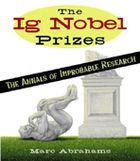
A UK/US team that came up with an equation to predict the shape of a ponytail has earned itself an Ig Nobel.
Patrick Warren, Raymond Goldstein, Robin Ball and Joe Keller picked up their prestigious award at a sellout gala ceremony at Harvard University.
Igs are intended as a bit of a spoof on the more sober Nobel science prizes.
Other 2012 winners included teams that studied how chimps could recognise each other from their behinds and why coffee will spill out of a moving mug.
Comment: The results of the yearly awards for the best of the worse... This is particularly sad as we watch the planet becoming more and more irradiated due to Fukushima nuclear reactor meltdowns and a catastrophic oil spill that has virtually destroyed an ocean due to sheer carelessness, amongst lots of other major issues that includes major cosmic changes that we are not prepared for ...
Shut up! Speech jammer among 2012 Ig Nobel winners
Phys.Org, 21st September 2012
The Trouble with Barbie Science
Recruiting women into the sciences with girly images can backfire
Scientific American, 11th September 2012

Many readers may remember Danica McKellar as Winnie Cooper on The Wonder Years. Some may know her as the author of the Chayes-McKellar-Winn Theorem in mathematical physics. Nowadays, she’s hoping that young girls will see her as a cool ambassador of math. In her newly released book, “Girls Get Curves,” McKellar explains why geometry is worth knowing: it promotes logical thinking and reveals why diamonds are shiny! Hmmm.
Comment: All I could do was laugh reading the beginning of this article because it was so dumb... Society has been so busy dumbing down and stupidifying people that now there is a problem of too many stupid shallow people about. We need people with brains to help society cope with the world's transformation, we don't need more bimbos....
Biologist Rupert Sheldrake Explains the Ten Dogmas Holding Science Back
Daily Grail, 21st August 2012
'Maverick biologist' Rupert Sheldrake thinks there is a big problem in science, caused by those who employ it as a belief system, rather than using it as a method of inquiry. He thinks science is being held back by the former, and in his soon-to-be-released book Science Set Free (already available in the UK as The Science Delusion) he offers the "ten dogmas of science" that he thinks need to be treated with more suspicion than they currently are:
Comment: It's not just scientists who are at fault for creating dogmas and turning science into a religion. There are those using science to sell their fakery, the best current example is those who are using the uncertainty principle of quantum mechanics and turning this into a justification for the
The Law of Attraction nonsense. If you get up close and personal with the New Age wizards, you will find they are not so foolish as to rely on 'positive spin', some have far more sinister ways of manipulating people and getting what they want....
Thomas Kuhn: the man who changed the way the world looked at science
Fifty years ago, a book by Thomas Kuhn altered the way we look at the philosophy behind science, as well as introducing the much abused phrase 'paradigm shift'
The Guardian, 19th August 2012
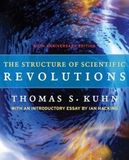
Kuhn's central claim is that a careful study of the history of science reveals that development in any scientific field happens via a series of phases. The first he christened "normal science" – business as usual, if you like. In this phase, a community of researchers who share a common intellectual framework – called a paradigm or a "disciplinary matrix" – engage in solving puzzles thrown up by discrepancies (anomalies) between what the paradigm predicts and what is revealed by observation or experiment. Most of the time, the anomalies are resolved either by incremental changes to the paradigm or by uncovering observational or experimental error. As philosopher Ian Hacking puts it in his terrific preface to the new edition of Structure: "Normal science does not aim at novelty but at clearing up the status quo. It tends to discover what it expects to discover."
The trouble is that over longer periods unresolved anomalies accumulate and eventually get to the point where some scientists begin to question the paradigm itself. At this point, the discipline enters a period of crisis characterised by, in Kuhn's words, "a proliferation of compelling articulations, the willingness to try anything, the expression of explicit discontent, the recourse to philosophy and to debate over fundamentals". In the end, the crisis is resolved by a revolutionary change in world-view in which the now-deficient paradigm is replaced by a newer one. This is the paradigm shift of modern parlance and after it has happened the scientific field returns to normal science, based on the new framework. And so it goes on.
Comment: There is a lot that can be said but it is important to realise that there are very few people who will rock the boat even when there are glaring inconsistencies in prevailing theory. In my research I have found that historically, there are usually some people 20, 30, 40, 50+ years ahead of their peers, but they are ignored by the mediocre because there are too many people who prefer safety in numbers... think lemmings.... Now, that I have been studying human development, I have realised there are a lot of people who are simply incapable of thinking outside of the box and will simply perpetuate old ideas without asking any questions... As opposed to original thinkers, the obvious is not so obvious for those who simply cannot process enough data needed to come up with a new answers to old problems.
Japanese Anesthesiologist Completely Faked 172 Papers
Pop Sci News, 4th July 2012

Science // Scientific papers are faked sometimes. That's obviously dangerous, especially when the researcher works for the pharmaceutical industry or has a clear agenda. But we've never seen anything quite like this: a Japanese anesthesiologist named Yoshitaka Fujii has been found to have fabricated a hundred and seventy-two papers over the course of 19 years, more than even Joachim Boldt, who fabricated 90.
Comment: The issue is not about just one person, as insiders tell us that subverting the scientific method is quite widespread.
Harvard To Be Tried for Alzheimer's Research Fraud
AHRP, 10th May 2012

The US Court of Appeals, 1st Circuit overturned a summary judgement by a lower court ordering a whistleblower lawsuit filed by Dr. Kenneth Jones against Harvard Medical School, its teaching hospitals, Brigham and Women's and Massachusetts General Hospital, and Dr. Marilyn Albert (Principal Investigator) and Dr. Ronald Killiany to proceed to trial.
The case involves the largest Alzheimer's disease [AD] research grants awarded by the National Institutes of Health (from 1980 through 2007) for a large project aimed at identifying early physical signs of Alzheimer's by scanning certain regions of the brain with MRIs.
Dr. Jones was the chief statistician for the NIH grant. He blew the whistle after realizing that measurements used to demonstrate the reliability of the study had been secretly altered. Without these alterations, Dr. Jones explained, there was no statistical significance to the major findings of the study. When he insisted that the altered measurements be subjected to an independent reliability study, and that the manipulated results could not be presented as part of a $15 million federal grant extension application, he was terminated and his career came to an end.
Comment: The corruption in science is extensive but as it seems, everyone in the scientific community knows it is a problem too. The issue is that the general public don't realise this....
Scientific dishonesty and nuclear power - Article by Chris Busby
We can do better, 20th January 2012
 Dishonesty and the Science Policy Interface
Dishonesty and the Science Policy Interface
Dr Christopher Busby
There is a problem I want to draw to the attention of those who watch the world and the antics of those who run it. It is a problem that has exercised my mind for some time, one that I came to as a result of my interest in the health effects of low dose radiation. I have written about my researches and discoveries in this area (Busby 1995, 2006) and most recently about the health effects of uranium weapons (Busby UNIDIR 2009). But as I conducted my naïve enquiries in these areas of science, it dawned on me quite early on, that there was a dangerous gap between what the politicians and those who ran the show believed (or said they believed) and the facts, if I may (also naïvely) call them that.
Comment: Busby names names but he also tells us how these scientific felons operate and what he thinks their motivation is... However, it's the overall system of people being hand-picked because they are easy to manipulate that is most interesting.
Top Science Scandals of 2011
A list of this year’s most high-profile retractions and controversies in science
The Scientist, 19th December 2011
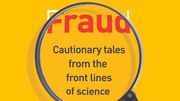
Science is no stranger to controversy. This year, some high profile scientists have been accused of widespread misconduct, while other headline-grabbing research has been retracted after technical errors or sloppy techniques were pointed out by critics.The scientific field may deal with aftershocks of the misconduct or retraction for years.
Here are five of the biggest science scandals of the year, as well as updates on some of the juiciest scandals of years past.
Comment: There is no mention of Climategate but a climate skeptic who had a retraction of a poor paper is mentioned. This seems rather biased as it is widely acknowledged that there is a general climate of fraud associated with climate science.
What Is Peer Review for?
Scientific America, 2nd November 2011

There is a lot of back and forth right now amongst the academic technorati about the “future of peer review”. The more I read about this, the more I’ve begun to step back and ask, in all seriousness:
What is scientific peer-review for?
This is, I believe, a damn important question to have answered. To put my money where my mouth is I’m going to answer my own question, in my own words:
The scientific peer-review process increases the probability that the scientific literature converges–at long time scales–upon scientific truth via distributed fact-checking, replication, and validation by other scientists. Peer review publication gives the scientific process “memory”.
Comment: I picked this link up from the article
Psychologist admits to faking dozens of scientific studies about the Diederik Stapel scandal. It stated: "Those of you who are curious about how something like this could happen despite well-established peer-review practices, or if you're simply looking for an incisive exploration of what the peer review process is, what it isn't, and what it's for, check out this timely piece by Scientific American's Bradley Voytek." Well, peer review does not work when there are vested interests that control what people believe in society and scientists generally 'succeed' if they comply within the current paradigm and scientific worldview controlled by invisible 'powers'... As some scientists make very clear, scientists are well trained like dogs. If they conform they get grants, like a dog will get dog biscuits, if they don't conform they don't get the grants they need and so they can't do the scientific research. Hence, those who have some integrity but want to do some real science that is outside of the normal concensus view tend to have quite a difficult time on many levels. As we have seen with the massive scandal of Climategate and many other examples of fakery, especially in the medical scientific community, scientists across the board admit that this is now a serious problem. However, it is just symptomatic of the corruption of society where people prefer lies and cheating to honour and truth. This is a quote I like:
"I think basically becoming famous has taken the place of going to heaven in modern society, hasn't it?" -- Jarvis Cocker
Jarvis Cocker: 'Music has changed. It's not as central, it's more like a scented candle'. The Guardian, 16th October 2011
Report finds massive fraud at Dutch universities
Nature News, 1st November 2011

When colleagues called the work of Dutch psychologist Diederik Stapel too good to be true, they meant it as a compliment. But a preliminary investigative report (go.nature.com/tqmp5c) released on 31 October gives literal meaning to the phrase, detailing years of data manipulation and blatant fabrication by the prominent Tilburg University researcher.
"We have some 30 papers in peer-reviewed journals where we are actually sure that they are fake, and there are more to come," says Pim Levelt, chair of the committee that investigated Stapel's work at the university.
The data were also suspicious, the report says: effects were large; missing data and outliers were rare; and hypotheses were rarely refuted. Journals publishing Stapel's papers did not question the omission of details about where the data came from. "We see that the scientific checks and balances process has failed at several levels," Levelt says.
Comment: I will admit, I burst out laughing when I read that nobody asked where the data was coming from... Obviously, this professor was too much of a god-guru to be a liar... Reports say he has already been fired but the Wikipedia entry for
Diederik Stapel says that: "an extensive report will investigate all his 130 articles and 24 chapters in books." So............. he was so trusted because he was a professor that nobody bothered to check his work (however, I will admit I am impressed that three young researcher eventually turned him in....) but this scenario is probably being repeated all over the planet and then the results foisted onto society; morsels of crap like "meat eaters are more selfish than vegetarians...". Just wow...
Diederik Stapel: The Lying Dutchman
Washington Post, 1st November 2011
OK, I just liked the headline...
Stapel report finds faked data in at least 30 papers, possibly more
Retraction Watch, 31st October 2011
There is an interesting comment here that is worthy of being highlighted:
Recently, and for diverse reasons, I’ve looked back at the history of Marc Hauser, reviewed the extended American Anthropology Association saga, re-read parts of Pinker’s “Blank Slate,” pondered the peculiar collapse of Stephen Gould’s case against 19th century brain research, and now followed the Stapel story. The question, not to put too fine a point on it, is this: what do we do if an entire field of science is so infected with fraud and agenda-driven literature that it simply isn’t trustworthy any more?
Maybe that’s the case with social psychology. Maybe it’s not. But it’s a problem which is simply no longer excusable as some dilute Poisson-distributed behavior by a tiny group of three-sigma deviants. The Stapel matter isn’t a scandal. It’s one more symptom of a real level of systemic rot in this particular discipline. It needs to be addressed as such.
Actually, I have been having similar thoughts about the metaphysical community; is it just too rotten? Not enough spiritual intelligence combined with a great preference for childish beliefs, magical thinking and pseudoscience.
Tilburg professor faked data in at least 30 academic publications
Dutch News, 31st October 2011
"
In total, statistics quoted in 150 papers dating back to 2004 when Stapel worked at Groningen University, are being examined."
In a written response to the allegations published on the Brabants Dagblad newspaper website, Stapels says he has ‘failed as a researcher and academic’.
‘I realize now that my behavior has stunned and angered my colleagues and put my area of expertise – social psychology – in a bad light,’ he wrote. ‘I am embarrassed and deeply sorry for this.’
Please note: we only get some remorse when he is caught... He was not overwhelmed with guilt and decided to turn himself in, so was this just some kind of game where he delighted in fooling everyone around him?
Principle of the Universality: responsibilities of scientists
WUWT, 30th September 2011
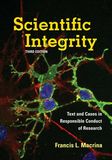 The Principle of Universality (freedom and responsibility) of Science
The Principle of Universality (freedom and responsibility) of Science
The free and responsible practice of science is fundamental to scientific advancement and human and environmental well-being. Such practice, in all its aspects, requires freedom of movement, association, expression and communication for scientists, as well as equitable access to data, information, and other resources for research. It requires responsibility at all levels to carry out and communicate scientific work with integrity, respect, fairness, trustworthiness, and transparency, recognising its benefits and possible harms.
Comment: Responsibility, integrity, respect, fairness, trustworthiness, and transparency, all words that many find abhorrent... However, I am pleased to see that there are now conferences on scientific integrity, lots of new websites highlighting felons and some of the 'old folks', Nobel Laureates etc, are getting publicly annoyed that scientists are starting to get a very bad reputation for duplicity (of course this does not include the Nobel Laureates that have faked their research for which they were given their prestigious award), but in any case, a few need to go to jail first for the message to really hit home hard amongst the scientific community.
Video analysis and scene replication suggests that Al Gore’s Climate Reality Project fabricated their Climate 101 video “Simple Experiment”
WUWT, 28th September 2011
Anthony Watts has taken the fabrication of this "simple experiment" very seriously and it has generated a lot of interest with over 640+ comments.
Beetle's beer bottle sex wins Ig Nobel Prize
BBC News, 30th September 2011
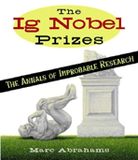
I'm sorry, run that one past me again.
That's right, certain Australian beetles will try to copulate with discarded beer bottles, but they have to be of the right type - brown ones with bobbly bits on them.
This fascinating observation made almost 30 years ago has finally landed entomologists Darryl Gwynne and David Rentz with an Ig Nobel Prize.
The Igs are the "alternative" version to the rather more sober Nobel awards announced in Sweden next week. [...]
Being given an Ig is nowadays regarded as something to be proud of, which may explain why seven of the 10 winners this year travelled to the ceremony at their own expense. Receiving their Ig from a real Nobel Laureate - seven of them were in attendance - probably added to the sense of achievement. [sad...]
Comment: It is always interesting to know about what scientists are researching, especially now when our whole modern technological world is under threat and when it seems the vast majority of the academic community are still oblivious.
Nobel Prize-Winning Physicist Resigns Over Global Warming
Fox News, 14th September 2011

The global warming theory left him out in the cold. Dr. Ivar Giaever, a former professor with Rensselaer Polytechnic Institute and the 1973 winner of the Nobel Prize in physics, abruptly announced his resignation Tuesday, Sept. 13, from the premier physics society in disgust over its officially stated policy that "global warming is occurring."
The official position of the American Physical Society (APS) supports the theory that man's actions have inexorably led to the warming of the planet, through increased emissions of carbon dioxide.
Giaever does not agree -- and put it bluntly and succinctly in the subject line of his email, reprinted at Climate Depot, a website devoted to debunking the theory of man-made climate change. "I resign from APS," Giaever wrote.
Comment: I am surprised at Fox News for pointing this out, even citing
Climate Depot, which is a den for serious climate skeptics ... Dr. Ivar Giaever is one of those old fashioned scientists who like to see old fashioned experiments (
Gedanken experiments are not good enough) and they like old fashion observations. Apparently, these old people think committing outright fraud is not science...
Surging Retractions in Scientific Publishing
Roger Pielke Jr, 11th August 2011
 The Wall Street Journal reports
The Wall Street Journal reports that retractions of scientific papers have surged in recent years, with
the top 3 journals issuing retractions being PNAS, Science and Nature. The graph above shows
the increase in the rate of retracted papers.
Pharmalot provides a summary:
[T]here were just 22 retraction notices that appeared in journals 10 years ago, but 139 were published in 2006 and by last year, the number reached 339. Through July of this year, there were a total 210 retractions, according to Thomson Reuters Web of Science, which maintains an index of 11,600 peer-reviewed journals.
Meanwhile, retractions related to fraud rose more than sevenfold between 2004 and 2009, exceeding a twofold rise traced to mistakes, according to an analysis published in the Journal of Medical Ethics. After studying 742 papers that were withdrawn from 2000 to 2010, the analysis found that 73.5 percent were retracted simply for error, but 26.6 percent were retracted for fraud. Ominously, 31.8 percent of retracted papers were not noted as retracted (read the abstract).
The conclusion? Either there is more fraud or more policing?
Comment: More evidence of "bad" science but according to watchers, the retractions are mostly related to the medical field which should help those climate scientists who have been under some intense scrutiny recently for their particular brand of poor/fake science.
Law experts speak out - academics who "guest author" medical journal articles guilty of fraud
Natural News, 3rd August 2011
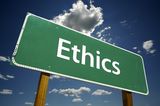
(NaturalNews) Back in 2008, Mike Adams sounded an alarm about something the mainstream media seemed to know little about -- Big Pharma companies had long been paying in-house writers to ghostwrite scientific research articles then paying (Adams called it "bribing") doctors and high-level academics to pretend they were the authors (http://www.naturalnews.com/023074_g...).
Unfortunately, the use of ghostwriters and guest authored journal papers hasn't gone away. But here's good news: two prominent attorneys are speaking out that the practice is not just a sham but constitutes legal fraud.
Comment: I suppose it's a question of integrity. If you have very little integrity then pretending that you wrote an article does not mean much to you. Only the same as people who buy diplomas to pretend that they have studied a subject and their studying and research has been monitored by qualified teachers. Calling yourself Dr. is very popular these days. Only the same as people who plagiarise other people's research or book and pretend they spent thousands of ours researching. Only the same as people who "borrow" other peoples' articles and pretend they are original, even when the internet means they will be usually found out pretty quickly. Only the same as those who try to pretend they sat in the lotus position for a few days and were given some kind of divine revelation when all they have done is stolen someone else's research, work or book contents and then they have the nerve to quote liberally, with no reference to the original source. So, this is a question of integrity and it seems to be in short supply these days.
Peer Review or Poor Review? - You Decide
Thunderbolts.info, 24th April 2011

The paper titled "Classical peer review: an empty gun"[1] by Richard Smith is a study which is focused on medical review but which applies to all scientific disciplines.
From Smith's study:
If peer review was a drug it would never be allowed onto the market,' says Drummond Rennie, deputy editor of the Journal Of the American Medical Association and intellectual father of the international congresses of peer review that have been held every four years since 1989. Peer review would not get onto the market because we have no convincing evidence of its benefits but a lot of evidence of its flaws.
[Emphasis added - DS]
Yet, to my continuing surprise, almost no scientists know anything about the evidence on peer review. It is a process that is central to science - deciding which grant proposals will be funded, which papers will be published, who will be promoted, and who will receive a Nobel prize. We might thus expect that scientists, people who are trained to believe nothing until presented with evidence, would want to know all the evidence available on this important process. Yet not only do scientists know little about the evidence on peer review but most continue to believe in peer review, thinking it essential for the progress of science. Ironically, a faith based rather than an evidence based process lies at the heart of science.
Comment: This is based on a research paper concerned with medical review but from the literature on the matter, the great concerns imply that most scientists see peer review or
sneer review as a way of maintaining the status quo and has very little to do with advancement, rather the opposite. Anthony Watts has quite a few articles on this matter with some hilarious cartoon imagery.
Bias In the Peer Review Process: A Cautionary And Personal Account
WUWT, 20th April 2011
There is, unfortunately, no vaccine against stupidity
The Punch, 7th January 2011
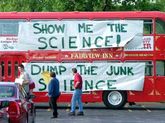
The British Medical Journal has devoted an editorial to stating that an article published in popular medical journal The Lancet in 1998 linking childhood vaccination with autism “was in fact an elaborate fraud.”
The Lancet had already retracted the article by Andrew Wakefield early last year, but BMJ now sought to totally discredit the “study”, which led to a decline in the triple vaccination of measles, mumps and rubella in Britain as well as in the United States and Australia.
Sadly, despite the strength of the BMJ articles - brought on by the work of Sunday Times investigative journalist Brian Deer - there will still be people who will not only ignore it but view it as further evidence of the conspiracy.
You can read more about Wakefield’s fraud here. It also goes without saying that The Lancet has a responsibility for the Wakefield paper (he’s no longer a doctor by the way, barred from medical practice on the basis of financial conflict and unethical treatment of children) because it made the serious mistake of publishing this quackery in the first place.
Comment: The first comment posted here refers to quackery which is quite amazing when you consider the amount of time and effort that has been given to denouncing alternative methods of healing as "quackery". The sad thing is that most people still believe that the scientific world is run with integrity, but insiders know that this notion is a long way from the truth. We now have websites dedicated to exposing scientific fraud, but there is still the problem of scientists ignoring observational data/scientific analysis that does not fit the paradigm, to perpetuate a consensus view that is wrong. So, besides the climate of fraud that was so completely revealed in the Climategate saga, there is the everyday issue of the perpetuation of out of date and misleading theories. I was stunned to recently find that the common theory of the evolution of the human brain has been overturned, but even more shocked to find that someone had boldy made the claim in the 1920s that the evidence showed that the Darwinian inspired theory of the
EVOLUTIONARY LAYERS OF THE HUMAN BRAIN did not match the evidence. Darwin's theory of evolution has so many holes, that the ship has in reality already sunk, but the theory is now such a powerful meme in the human collective that many scientists still cling to the hope of some proof and hence the repeated announcements of "the missing link" between humans and animals, like the recent Ida fossil which was quickly dismissed as another hoax. Now we are left with all the texts books that have been written and even laws that Darwin's Theory of Evolution is the only theory of evolution that can be taught, which will ensure that the ghost of this theory will live on for many more years. At the back of my mind, I wonder whether the scientific frauds are perpetrated today because some scientists have realised that science is not about a correct interpretation of the current scientific knowledge, but rather, a skilful manipulation of other people's perceptions.
Darwin's Theory Of Evolution - A Theory in Crisis
All about Science, Date N/A
Imagine eating if you want to lose weight, say scientists
Just imagining eating calorific food such as chocolate can reduce your appetite and help you lose weight, claim psychologists
The Guardian, 9th December 2010

Ever wished you could cut down on the amount you eat without going hungry? It turns out all you need is a good imagination. Scientists have found that going through the mental motions of eating, say, a chocolate bar, will help.
The result, from a study of more than 300 volunteers, seems to fly in the face of intuition that imagining a delicious meal will make your mouth water even more.
Carey Morewedge, an assistant professor of social and decision sciences at Carnegie Mellon University in Pennsylvania, and the lead author of the research, which is published in Science, said: "We think our results may be used to craft behavioural interventions that allow people to eat less of the unhealthy foods they crave and also to choose healthier foods.
"We hope it can also be used to give us [help] on cravings for other substances including cigarettes and alcohol."
He said: "Trying to suppress one's thoughts of desired foods in order to curb cravings for those foods is a fundamentally flawed strategy.
"Our studies found that people who repeatedly imagined the consumption of a morsel of food — such as an M&M or cube of cheese — subsequently consumed less of that food than people who imagined consuming the food a few times or performed a different task."
Comment: Here we are told about the power of our thoughts... Quite frankly, I have become extremely cynical of this kind of talk in the New Age world, because for most, it has turned into magical thinking. I remember being completely shocked when I was with someone in a cafe. This person was liberally adding maple syrup to a pancake and telling me she believed that she would not get fat. Well, I saw this person about a year later and they had bloated. I know all about having a sedentary lifestyle and being overweight, but I could not seriously consider this scientific research as a suitable remedy.
Tempest in a teapot: International team of scientists describes swirling natural phenomena
Watts Up With That, 30th November 2010

Via press release: (Santa Barbara, Calif.) –– Scientists can use cylinders as small as teapots to study the mechanisms involved in powerful hurricanes and other swirling natural phenomena.
The earth’s atmosphere and its molten outer core have one thing in common: Both contain powerful, swirling vortices. While in the atmosphere these vortices include cyclones and hurricanes, in the outer core they are essential for the formation of the earth’s magnetic field. These phenomena in earth’s interior and its atmosphere are both governed by the same natural mechanisms, according to experimental physicists at UC Santa Barbara working with a computation team in the Netherlands.
Using laboratory cylinders from 4 to 40 inches high, the team studied these underlying physical processes. The results are published in the journal Physical Review Letters.
Comment: The comments posted here are mostly pure ridicule of this scientific research and I am not sure if this could be considered as a suitable guage for skepticism about science in general. However, saying that, the following classic comment providing a cynical denouement of the way that science works is worth noting.
CodeTech says: November 30, 2010 at 10:29 am
At the risk of sounding too cynical, here’s how this works:
1. Determine that vortices are inadequately understood (a good thing)
2. Launch a research program to understand vortices (a good thing)
3. Finance program by pointing out that vortices are involved in hurricanes, tornadoes and other weather phenomena that are expected to get worse with AGW (a not-so-good thing)
4. Repeat grade-school level experiments which THIS poster performed in grade 6 (blue and red food coloring to show the swirls), claim they’re unexpected and nobody ever noticed before
5. Create a simplified model, sell model to ILM for use in CG used in movies and TV ads, recoup all research program costs
6. Integrate vortex models into Model E, watch in awe as the planet is obliterated by vortices within another few ppm of CO2
7. Exclaim that this is all worse than we thought, and if CO2 emissions don’t stop IMMEDIATELY the entire planet down to the 2 million degree molten core will be torn asunder by vortices. Create HighDef video demonstrating the destruction
8. Sell HighDef video as opening sequence in new climate porn blockbuster Hollywood movie. Earn enough for another home in the tropics. Beachside.
9. Have Vortex Theory and simplified model forcefully inserted into school textbooks, along with a few disclaimers about how most students will never reach adulthood because the Vortices will destroy the planet before then.
10. Determine that all Vortices, globally, are man-made, and before humans walked the Earth there was never a Vortex, ever. Nobody EVER found dinosaur trailer parks torn apart by a tornado, right?
11. When asked by a 7 year old, “aren’t those little winglets on the tips of airplanes because of Vortices?”, rant uncontrollably for hours about how NOBODY ever studied Vortices before you, and that’s all a plot by the Vortex Deniers, funded by Big Calm.
12. Go on anti-depressants after your private emails between you and the NASA guys who first studied Vortexes in the 50s are publicly released. IN spite of the fact that only 4 people downloaded them.
13. End up on late night TV discussing how your enemies in highly funded fossil fuel denier cabals managed to completely destroy you.
14. Found dead in fleabag hotel room in some town nobody ever heard of, a victim of the grand Vortex conspiracy.
There are some points that are hard to deny related to how certain scientific concepts are enforced.
Rates of Scientific Fraud Retractions
Nature Blogs, 17th November 2010

Ivan Oransky on his Retraction Watch blog
pointed to a paper by R. Grant Steen looking at numbers of retraction and whether they were due to fraud or error. Ivan pointed to
a news item on The Great Beyond by Richard Van Noorden looking at one slightly surprising claim in the paper:"American scientists are significantly more prone to engage in data fabrication or falsification than scientists from other countries". Van Noorden looked at the data in a bit more detail and wasn't convinced, but didn't fully run the numbers. So I thought I would. [...]
We can see that the US has a slightly higher estimated rate of retraction due to fraud, which corresponds to about 30% more fraud per paper than average. But China and India have higher rates of retraction due to fraud than the US (and p-value fans will be happy to know that they are both statistically significance, with lots of stars to make you happy). China has about 3 times as many fraud retractions per paper as average, and India 5 times as many.
What does this mean for fraud and dishonesty? It may not mean that Indian scientists are more dishonest: it may be that they are no more or less honest than anyone else, just they they are caught more often and made to retract. I'll let others debate that: I have weak opinions, but no more data to back these up.
But Richard Van Noorden was right in his conclusions: the US doesn't produce the papers most likely to be retracted because of fraud. More generally, one should normalise by the right thing - and also be careful about what you're actually measuring: it may not be what you want to measure (here it's not the rate of fraud but the rate of retraction because of fraud).
Comment: It looks like there has been a small firestorm caused by the Steen paper article article and a blogger has gone to work to seek the truth. Well, maybe we have the Magician Effect here, because instead of seeing US scientists as being the worse scientific fraudsters, this should have been balanced with the notion that maybe peer review in other countries could more vigilant in catching bad scientific papers before they are published.
US scientists significantly more likely to publish fake research
PhysOrg.com, 16th November 2010
 US scientists are significantly more likely to publish fake research than scientists from elsewhere, finds a trawl of officially withdrawn (retracted) studies, published online in the Journal of Medical Ethics.
US scientists are significantly more likely to publish fake research than scientists from elsewhere, finds a trawl of officially withdrawn (retracted) studies, published online in the Journal of Medical Ethics.
Fraudsters are also more likely to be "repeat offenders," the study shows.
The study author searched the PubMed database for every scientific research paper that had been withdrawn—and therefore officially expunged from the public record—between 2000 and 2010.
A total of 788 papers had been retracted during this period. Around three quarters of these papers had been withdrawn because of a serious error (545); the rest of the retractions were attributed to fraud (data fabrication or falsification).
The highest number of retracted papers were written by US first authors (260), accounting for a third of the total. One in three of these was attributed to fraud.
The UK, India, Japan, and China each had more than 40 papers withdrawn during the decade. Asian nations, including South Korea, accounted for 30% of retractions. Of these, one in four was attributed to fraud.
The fakes were more likely to appear in leading publications with a high "impact factor." This is a measure of how often research is cited in other peer reviewed journals.
Comment: Well, something is obviously happening... we have a new Journal of Medical Ethics.... This article has to be read in context by knowing about the research work of Dr. John Ioannidis, who has spent his career challenging his peers by exposing their bad science, see the article:
Lies, Damned Lies, and Medical Science
The Atlantic, 1st November 2010
Reference
Steen, R. (2010). Retractions in the scientific literature: do authors deliberately commit research fraud? Journal of Medical Ethics DOI:
10.1136/jme.2010.038125
Lies, Damned Lies, and Medical Science
The Atlantic, 1st November 2010

Much of what medical researchers conclude in their studies is misleading, exaggerated, or flat-out wrong. So why are doctors—to a striking extent—still drawing upon misinformation in their everyday practice? Dr. John Ioannidis has spent his career challenging his peers by exposing their bad science. [...]
That question has been central to Ioannidis’s career. He’s what’s known as a meta-researcher, and he’s become one of the world’s foremost experts on the credibility of medical research. He and his team have shown, again and again, and in many different ways, that much of what biomedical researchers conclude in published studies—conclusions that doctors keep in mind when they prescribe antibiotics or blood-pressure medication, or when they advise us to consume more fiber or less meat, or when they recommend surgery for heart disease or back pain—is misleading, exaggerated, and often flat-out wrong. He charges that as much as
90 percent of the published medical information that doctors rely on is flawed.
His work has been widely accepted by the medical community; it has been published in the field’s top journals, where it is heavily cited; and he is a big draw at conferences. Given this exposure, and the fact that his work broadly targets everyone else’s work in medicine, as well as everything that physicians do and all the health advice we get, Ioannidis may be one of the most influential scientists alive. Yet for all his influence, he worries that the field of medical research is so pervasively flawed, and so riddled with conflicts of interest, that it might be chronically resistant to change—or even to publicly admitting that there’s a problem.
New Comment: After reading all of this article, I would say
this is the most serious condemnation of the currently pervasive junk science that I have come across in many years. Totally sobering! What's more, despite the condemnation by Dr John Ioannidis, who has seriously challenged the medical and scientific establishment, he has now become a hero! Completely and utter amazing!
Old Comment: As the surge of new energies reaches new heights, there is also an associated shift in human consciousness. Hence, more people are starting to think differently as a sign of human development and evolution, most importantly, integrity becomes more of a major issue... Simply, many people have much less tolerance for lies and deceit. Hence, this type of article is appearing in many different areas of science and voices are becoming more strident. The following short video [7:19] is by the author of the book
Confessions of an Rx Drug Pusher.
Gwen Olsen, the enlightened ex-pharma rep
Beyond Meds, March 2008
Robot goes berserk in Balkan lab: 6 boffins given dead arms
The Register, 14th October 2010
 ...reports are coming in from Slovenia of a horrifying and yet unambiguously newsworthy incident in which several scientists have reportedly been set upon and brutally beaten by a robot they were working on in their Ljubljana laboratory.
...reports are coming in from Slovenia of a horrifying and yet unambiguously newsworthy incident in which several scientists have reportedly been set upon and brutally beaten by a robot they were working on in their Ljubljana laboratory.
"A powerful robot has been hitting people over and over again," reports New Scientist, which broke the news of the mechanical rampage to an astonished world.
The pop-sci mag goes on to describe the robotic beatings in horrific detail. No fewer than six Slovenian boffins, all thought to be male, were struck "repeatedly on the arm" during the laboratory incident, in which a robot of a type normally employed in assembling vending machines went violently berserk and bludgeoned the men with an assortment of blunt instruments or sharp tools it had picked up using its powerful, motorised articulated arm.
There are sinister hints - indeed, outright assertions - in the article that in fact the droid assailant had been purposely programmed to attack the men by one of their colleagues, Borut Povše, a junior robot boffin at the University of Ljubljana. The six men were said to have suffered pain and injuries ranging from "mild" to "unbearable" as the rogue machine administered vicious and repeated dead arms. [...]
Povše brazenly defended his actions to the magazine, insisting that the robot attacks had not been a malicious prank or prompted by nefarious motives - for instance professional jealousy, or a desire to conquer the world at the head of an invincible army of robotic playground bullies.
Rather, Povše contended, he had instructed his metal henchman to attack the other scientists in order to discover better ways to program robots not to hurt people. Amazingly, this flimsy story was apparently accepted by some elements of the roboboffinry commun
Comment: So this programmer knew what he was doing ... this is the same mentality as scientists who give pregnant women radioactive food to eat, just to see what happens... There is a different perspective, maybe less inflammatory:
Researcher Allows Robot to Punch Colleagues During Lab Experiment
Daily Tech, 15th October 2010
The scientific world is fracturing
JoNova, 10th October 2010

The rift between real science (the
pursuit of truth) and PR-science (the pursuit of of money and power) is growing. Associations like The Royal Society, the APS, and the American Chemical Society are beginning to fracture internally as eminent members reject the unscientific pronouncements made on their behalf by small “secret and stacked” committees.
Hal Lewis comes from the elite upper levels of science — a physics professor at University of California (Santa Barbara), and a member of the Defense Science Board (a group of the top 40 or so, advising the Pentagon).
He’s resigned from the American Physical Society (APS) today, after 67 years. The APS is the world’s second largest organization of physicists, with 48,000 members. He is scathing of the fall from grace of the once renowned institution.
Anthony Watts is calling it “…an important moment in science history. I would describe it as a letter on the scale of Martin Luther, nailing his 95 theses to the Wittenburg church door.”
For reasons that will soon become clear my former pride at being an APS Fellow all these years has been turned into shame, and I am forced, with no pleasure at all, to offer you my resignation from the Society.
It is of course, the global warming scam, with the (literally) trillions of dollars driving it, that has corrupted so many scientists, and has carried APS before it like a rogue wave. It is the greatest and most successful pseudoscientific fraud I have seen in my long life as a physicist. Anyone who has the faintest doubt that this is so should force himself to read the ClimateGate documents, which lay it bare. (Montford’s book organizes the facts very well.) I don’t believe that any real physicist, nay scientist, can read that stuff without revulsion. I would almost make that revulsion a definition of the word scientist.
Comment: Jo Nova has produced some excellent research and has an highly respected blog, see her credentials online. I am impressed with her clear appraisal of the situation and the indication that there is serious unrest amongst scientists. In my opinion, it seems that we are going to have a serious war to return the scientific community back into it's original mandate and that is the honest search for truth and enlightenment. As someone who is interested in the integration of science and metaphysics in my pursuit of truth and enlightenment, I have quickly come to realise that the scientific concensus is often out of date and that scientists admit that they know that their colleagues are routinely fiddling data to produce results that help them prove their hypothesis. We even have a Nobel Prize winner who is under suspicion but he has been dealt with very very quietly, so that very few are aware of the insult to the world of scientific academia. The war for the honest search for truth and enlightenment within the scientific community, has started...
"The public might not understand the science, but they do understand cheating."
Dr. David Evans
Annual Ig Nobel awards presented for the most 'improbable' research
The Telegraph, 1st October 2010
 The Ig Nobels, designed to honour achievements that first make people laugh and then make them think, are presented in the run up to the real awards next week.
The Ig Nobels, designed to honour achievements that first make people laugh and then make them think, are presented in the run up to the real awards next week.
[...]
Italian physicists investigating organisations won the Management Prize after mathematically proving that randomly promoting employees actually made a company run more efficiently.
They found that contrary to popular opinion members of a "hierarchical organisation climb the hierarchy until they reach level of maximum incompetence".
The best way to avoid this was to either just randomly promote employees or randomly promote the best and the worst employees, the model showed.
British research was also awarded. The Peace Prize went to Keele University who discovered that swearing actually reduces pain.
They are given out at a Harvard University ceremony by the science humour magazine, Annals of Improbable Research.
Comment: Every year, the Ig Nobels never disappoint and act as a reminder that there is a lot of effort being spent in the pursuit of some useless information. However, this year, finding out that randomly promoting employees seems to be effective, has only confirmed my suspicions...
Confronting fraud in science
Book Review: On Fact and Fraud: Cautionary Tales from the Front Lines of Science,
David Goodstein
SPPI Blog, 3rd September 2010

[...] David Goodstein’s book On Fact and Fraud: Cautionary Tales from the Front Lines of Science offers a short and engaging education for those who want to know more about understanding and detecting true fraud. The author is well known in the field of condensed-matter physics, being recognized both for his research and for his outstanding, indeed seminal, 1975 textbook States of Matter.
In 1988 he became the vice-provost of the California Institute of Technology (Caltech), where he pursued issues of science and society, with a focus on scientific misconduct. Not only does he have vast experience, but he also co-developed and taught a course on scientific ethics for more than 10 years. Perhaps most importantly, while at Caltech he drafted one of the first formal policies on scientific misconduct. His thoughtful and groundbreaking procedures have since guided many of our great universities in dealing with such difficult matters.
After discussing how to detect pathological science, Goodstein presents a set of 15 precepts on how science works, including the charge that scientists must “bend over backwards” to report any way in which they might be wrong. He then succinctly describes our scientific “reward system” – a mechanism for promoting star performers that is closely linked to the scientific “authority structure”. Goodstein defines this structure as an 11-step ladder that starts with being admitted to a prestigious college and culminates in prizes such as named professorships, membership in the National Academy and a Nobel prize.
Comment: Quite frankly, I am still wondering why certain well known and exposed climate scientists are still not facing criminal fraud charges... Here, we are directed to the short article “How to judge flawed science” (2005 MRS Bulletin 30 75) by Ivan Schuller and Yvan Bruynseraede. I could not find a free copy but I did find a 60 page presentation which is part of a Biomedical Ethics Seminar Series called
Pathological Science, which can be downloaded
here. Btw, if you want a laugh, read the press cutting on pg 11 of this presentation which details a NASA scientist's misuse of anti-gravity technology, you will never think scientists are boring ever again!
UCLA fires professors for reporting real scientific data
Not Evil Just Wrong, 19th August 2010

James Enstrom, an epidemiologist at the UCLA School of Public Health, was recently fired, because his research "is
not aligned with the academic mission of the Department [of Environmental Health Sciences]."
Enstrom's crime? Not finding evidence that supports increased regulation by the California Air Resources Board
(CARB). He also pointed out that a prized supporter of CARB, Hien T. Tran, has a fake Ph. D. This is particularly
embarrassing because in December 2008, CARB approved diesel emissions rules based on Tran’s findings.
Enstrom is not the only one on the chopping block, so is Katy Grimes, an environmental health sciences professor
at UCLA, whose has also spoken out against diesel regulations.
Assemblyman Dan Logue is defending the two, for what appears to be a clearly politicized firing.
Comment: Huh-hum... I wonder if committing fraud was part of the professors' job description?
Science Turns Authoritarian
The American, 27th July 2010

Science is losing its credibility because it has adopted an authoritarian tone, and has let itself be co-opted by politics. [...]
To see if our suspicions were correct, we decided to do a bit of informal research, checking Lexis Nexis for growth in the use of what we would categorize as “authoritarian” phrasing when it comes to scientific findings.
We searched Nexis for the following phrases to see how their use has changed over the last 30 years: "science says we must," "science says we should," "science tells us we must," "science tells us we should," "science commands," "science requires," "science dictates," and "science compels."
What we found surprised us. One phrase, in particular, has become dramatically more frequent in recent years:
“Science tells us we should.” Increased usage of this phrase leads to a chart resembling a steep mountain climb (or, for those with a mischievous bent, a “hockey stick”). The use of the phrase “science requires” also increases sharply over time.
Comment: Very interesting... but the increasingly authoritarian tone maybe because the public have become increasingly sceptical of science due to major breaches of trust in recent decades.
Big Science & commercial science publishing = corruption of peer review & science
HIV Skeptic, 17th May 2010

[...] Hand in hand with rushing to produce anything that doesn’t rock the boat goes a fierce determination to exclude anything that threatens the bandwagon and gravy train. Peer review, like other aspects of science, has become thoroughgoingly corrupted by the change from “little science” to “Big Science”, which means commercial science, for-profit science.
It has become routine for editors to choose manuscript reviewers with a view to getting the advice they want, namely, something that will not rock the profitable mainstream boat. Don’t try to publish anything that questions HIV/AIDS theory, or Big-Bang theory, or human-caused global warming theory, or Darwinian evolution, or string theory, or an asteroid cause of dinosaur extinctions, or any other prevailing contemporary consensus.
Comment: There is definitely more articles pointing out the problem with the peer review process. As pioneers will tell you, peer review has become a very cosy way of keeping outsiders out that will rock the boat. The following has been called
The Modern Science Method:
- Form clique of friends
- Announce new “ground-breaking paper” to the press. Announce “result” in soundbite form.
- Get papers published peer reviewed by friends
- Go to United Nations and declare “the science is settled”
- Denigrate other scientists who disagree with you as “Deniers” and in league with [insert scary corporation here]
- Praise other “independent” scientific papers written by your friends which miraculously support your hypothesis.
- Repeat the above two processes so that you and your friends get lions share of grant money while your opponents are starved of funding and attention.
- Hide data/methodology so as to prevent replication. Make sure only copy of data is on a floppy disk and never, ever backed up like normal people.
- Start weblog.
- When cornered, declare that “science has moved on”
It could go on for years."
Judith, I love ya, but you’re way wrong …
WUWT, 25th February 2010

[...]
First, let me say that the problem is much bigger than Judith seems to think. Wiser men than I have weighed in on this question. In a speech at Clinton, Illinois, September 8, 1854, Abraham Lincoln said:
If you once forfeit the confidence of your fellow citizens, you can never regain their respect and esteem. You may fool all of the people some of the time; you can even fool some of the people all the time; but you can’t fool all of the people all of the time.
So it will not be easy. The confidence is forfeit, that ship has sailed.
The biggest problem with Judith’s proposal is her claim that the issue is that climate scientists have not understood how to present their ideas to the public. Judith, I respect you greatly, but you have grabbed the wrong end of the stick. The problem is not how climate scientists have publicly presented their scientific results. It is not a communication problem.
Comment: At the moment, there is a lot of debate about dealing with the aftermath of Climategate, but here Willis Eschenbach is doing a Dr. Phil and telling those whose heads are still in the clouds, exactly how the scientific community is being perceived by the informed general public. I have always liked this quote (coined by Phineas T. Barnum, the great showman and circus owner and quoted by US president, Abrahanm Lincoln). It would be very useful if this quote is bandied around more, to remind the fraudsters out there that it's very hard to keep a perfect cover.
Hermetic Jargon
Scientist quits: ‘I don’t want to remain a member of an organization that …screws up science that badly.’
Watts Up With That, 11th February 2010
 Hermetic Jargon
Hermetic Jargon
Farewell Message to the Dutch Academy
As soon as scientists and scholars from different disciplines talk to one another, confusion creeps in. In everyday language, words evoke clusters of associations, suggestions, hints and images. [...]
Disciplines are divided by their languages. Incomprehensible journal articles and oral presentations, ever-expanding university libraries, endless bickering over the appropriation of research funds, resources, and post-doc positions:
The Temple of Science has become a Tower of Babel.
A Babylonian confusion of tongues has become the organizing principle. As soon as more than a couple dozen scientists unite around the same theme, another specialist journal is created, comprehensible only to the in-crowd. If this is science, I want to get off.
Many years ago, two members of the Royal Netherlands Academy of Arts and Sciences tried to call attention to the problem. One was the leading art historian and Director of the Rijksmuseum in Amsterdam, Henk van Os, the other the retired methodologist of the social sciences, Adriaan de Groot. The two elderly gentlemen arranged a discussion meeting on the peer review system at Academy headquarters. Being an Academy member myself, I eagerly participated. In their introduction van Os and de Groot explained how
all disciplines have a tendency to develop their own ‘hermetic jargon,’ the secret language that eliminates the risk of having to discuss the foundations of one’s discipline with the outside world.
Comment: The above is a translation from a Dutch newspaper article that includes a letter of resignation by a top Dutch academic. It eloquently states his reasons for deciding to leave his position that seems to be broadly about how science is run and especially the use of language to stop 'outsiders' understanding the foundations of a scientific discipline. When I was researching my book, it was tough going because NOBODY had considered Space Weather as a fulfillment of prophecy re 2012 and so I had to read articles and research papers aimed at the scientific community with all the jargon. It has got better because scientists had to provide info for the military and engineers, so that cuts down the amount of verbiage. I did find that the best research papers were written by people where English was their second language and so provided a better read for someone just trying to understand the basic scientific theories and perspectives. These days when people try to dismiss something and they shout it's not scientific, I will just say, so what? After Climategate and the other scientific scandals that I have not even bothered to cover, with the depth of hypocrisy that is being uncovered, I think the thinkers who know what is going on, will acknowledge the point.
Climategate: Plausibility and the blogosphere in the post-normal age.
Watts Up With That, 9th February 2010
 I’m honored to offer this guest post by Jerome Ravetz, of Oxford University in the UK.
I’m honored to offer this guest post by Jerome Ravetz, of Oxford University in the UK. Mr. Ravetz is an environmental consultant and professor of philosophy of science best known for his books challenging the assumptions of scientific objectivity, discussing the science wars and post-normal science.
Comment: The heavyweights have joined the fray! Considering that this piece was written by an Oxford University professor, it is remarkable straight forward to read. What's more, we have it on good authority that the science behind Climategate has been rumbled! There are some gems that I hve picked out that I believe will become part of the modern scientific lexicon, here are some quotes:
-
It takes determination and skill for a scientist who is committed to social responsibility, to avoid becoming a ‘stealth advocate’
-
We can begin to see what went seriously wrong when we examine what the leading practitioners of this ‘evangelical science’ of global warming.
-
We found ourselves in another crusading ‘War’, like those on (non-alcoholic) Drugs and ‘Terror’. This new War, on Carbon, was equally simplistic, and equally prone to corruption and failure.
-
All critics, even those who were full members of the scientific peer community, had to be derided and dismissed. As we learned from the CRU e-mails, they were not considered to be entitled to the normal courtesies of scientific sharing and debate. Requests for information were stalled, and as one witty blogger has put it, ‘peer review’ was replaced by ‘pal review’.
-
A well-known expert in uncertainty management, Jeroen van der Sluijs, explicitly condemned the ‘overselling of certainty’
-
Part of the historic significance of Climategate is that the scandal was so effectively and quickly exposed...
To explain how it all happened so quickly and decisively, we have the confluence of two developments, one social and the other technical. For the former, there is a lesson of Post-Normal Science, that we call the Extended Peer Community.
-
Do we face the prospect of the IPCC reports being totally dismissed as just more dodgy dossiers, and of hitherto trusted scientists being accused of negligence or worse?
-
A distinguished scholar, Sheila Jasanoff, has called for a culture of humility among scientists, itself a radical move towards a vision of a non-violent science.
Please note the final statement:
"My thanks to numerous friends and colleagues for their loyal assistance through all the drafts of this essay. The final review at a seminar at the Institute of Science, Innovation and Society at Oxford University was very valuable, particularly the intervention from 'the man in the bus queue'."
This has been the hallmark of the success of the bloggers who banded together, the learned and the unlearned worked towards a common goal, where the momentum was maintained by adhering to the highest standards of truth. This is making me re-examine again the crapiness and low standards that I have experienced in my own search for truth and enlightenment, as all these highlighted phrases have a direct parallel with what is going on on the New Age world, and I would say that you can replace "War on Carbon* with "War on the mind". Hence, the refrain for the last few years has been: where is the quality? Well, I am now examing the science and philosophy behind the low standards that plague seekers of truth in the spiritual world, it's enlightening but at the same time, I realise there must be others who understand the predicament. See also update:
Jerry Ravetz part 2 – Answer and explanation to my critics
Only one person in ten believes in Government statistics
Daily Mail, 30th December 2009

Only one person in ten believes in Government statistics, a survey found yesterday.
The great majority of the population thinks either that the figures are either wrong or bent by politicians. [...]
The Harris Interactive poll for the Financial Times said that 10 per cent of adults believe official figures are accurate. The same number again believe the figures are produced without interference from politicians.
Around six per cent of people think that official figures are honestly used by the Government, the survey said.
But seven out of ten believe the statistics are maniulated for political purposes and even more think they have been spun either by politicians or the news media that report them.
Comment: LOL!! Maybe people are becoming more discriminating.... well, that's all part and parcel of spiritual evolution....
New Scientist becomes Non Scientist
JoNova, 16th December 2009
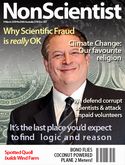
You might think journalists at a popular science magazine would be able to investigate and reason.
In DenierGate, watch New Scientist closely, as they do the unthinkable and try to defend gross scientific malpractice by saying it’s OK because other people did other things a little bit wrong, that were not related, and a long time ago. Move along ladies and gentlemen, there’s nothing to see…
The big problem for this formerly good publication is that they have decided already what the answer is to any question on climate-change (and the answer could be warm or cold but it’s always ALARMING). That leaves them clutching for sand-bags to prop up their position as the king-tide sweeps away any journalistic credibility they might have had.
Comment: Often those who are interested in metaphysics and the spiritual realms are derided and accused of pseudoscience. Yet, scientists often accuse each other of pseudoscience, whilst many scientists admit they know their colleagues are cooking the data to obtain the results they want. Hence, when the ignorant complain about pseudoscience, it is probably most certain that it's a buzz word that they think is a an adequate put down. Here, Jo Nova is highlighting that scientific journals have forgotten what science is really about and no doubt
Karl Popper of popperazzi fame will be turning in his grave due to the massive Climategate science scandal. For those interested in the true distinction between science and metaphysics, the following paragraph may be useful, but the source 'forgot' to mention that Popper received the Nobel Prize in Physics in 1922 and that puts him amongst the greatest scientists that have ever lived.
There is a philosophical objection called Popperism that people raise against the landscape idea. Popperism [after the philosopher Karl Popper] is the assertion that a scientific hypothesis has to be falsifiable, otherwise it’s just metaphysics. Other worlds, alternative universes, things we can’t see because they are beyond horizons, are in principle unfalsifiable and therefore metaphysical – that’s the objection. But the belief that the universe beyond our causal horizon is homogeneous is just as speculative and just as susceptible to the Popperazzi. source
'Dad dancing' may be the result of evolution, scientists claim
World of Technology, 15th December 2009

Bush dances with Senegalese performers from the West African Dance Company during an event marking Malaria awareness day, in the Rose Garden of the White House
The cringeworthy "dad dancing" witnessed at wedding receptions every weekend may be an unconscious way in which ageing males repel the attention of young women, leaving the field clear for men at their sexual peak.
"The message their dancing sends out is 'stay away, I'm not fertile'," said Dr Peter Dad, a psychologist at the University of Hertfordshire who has compared the dancing styles and confidence levels of nearly 14,000 people.
His research has backed up scientific studies showing a connection between dancing, hormones and sexual selection.
Comment: I am sure that this research has to be a serious candidate for an Ig Nobel Prize... I wonder if they studied the infamous 'dance' by Ricky Gervais in
The office, which has got to be the most brilliant example of terrible dancing on record, but of course I could be wrong....
Scientific Community Unfair to Dr. Rupert Sheldrake, Imperial College London Dissertation Asserts
Skeptico, 1st December 2009
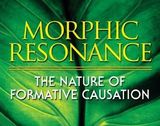
Faced with choosing a prominent figure for his Science and Society Masters dissertation, Phillip Stevens avoided the obvious. Instead of Kepler, Newton, or Darwin, Stevens chose controversial British biologist, and Perrott-Warrick Scholar, Dr. Rupert Sheldrake. “I’d known about Rupert Sheldrake and I found him very interesting”, Phillips said.
Although skeptical of Sheldrake’s theories, Phillips focused on how Sheldrake was being judged, “I wanted to be impartial as to whether he was right or wrong and instead go on and look at whether he’d been treated fairly.”
What he discovered surprised him. Stevens found that despite an unblemished academic record and a research fellowship at the Royal Society, Sheldrake faced public scorn from colleagues for publishing his theory of morphic fields which suggests a living, developing universe with its own inherent memory.
Comment: This is a little confusing. The Skeptico website states it is a leading source for intelligent, hard-nosed skeptic vs. believer debate on science and spirituality, but here they are not afraid to tell you that one of their 'targets' sorry 'believers' has been unfairly treated in the past. So here we have a short introductory article with a link to Phillip Steven's 44 page Masters dissertation & podcast. Incredibly, it seems that Rupert Sheldrake has been exonerated! We are even told, that when Sheldrake's research was replicated, the scienitist involved 'forgot' to report the fact that Sheldrake's conclusions were correct! Of course, sometime in the future, everybody will agree that Morphogenetic fields exist and Sheldrake was right all along, but meanwhile, he has had to put up with some rough treatment.
Do you appreciate the laws of physics?
2.bp.blogspot.com, December 2009

A very big Thanks to Michigan member Mike Patridge who sent in this bit of humour, which was forwarded from a senior level person at Chrysler. This date on this note was Sunday, July 2009. [...]
Mr. Cole, who is an engineer by training, told many stories of the difficulty of working with the folks that the Obama administration has sent to save the auto industry. There have been many meetings where a 30+ year experienced automotive expert has to listen to a newcomer to the industry, someone with zero manufacturing experience, zero auto industry experience, zero finance experience and zero engineering experience, tell them how to run their business. Mr Cole's favourite story is as follows: There was a team of Obama people speaking to Mr Cole (engineer, automotive experience 40+ years, and Chairman of CAR). The were explaining to Mr. Cole that the auto companies needed to make a car that was electric and liquid natual gas...
[...] Mr Cole explained that to do this you would need a TRUNK FULL of batteries and a LNG tank as big as the car to make that happen, and that there were problems related to the laws of physics that prevented them...
The Obama person interrupted and said (and I am quoting here): "These laws of Physics? Whose rules are those? We need to change that." (Some of the others wrote down the law name so they could look it up.) "We have the congress and administration. We can repeal that law, amend it, or use an executive order to get rid of that problem. that's why we are here, to fix these sorts of issues."
Comment: The quote finishes with a political comment on fixing healthcare, but I immediately thought of people wanting to geoengineer the climate which is far more worrying.... Anyway, I hooted with laughter when I read this... But, seriously, I realised over five years ago that all metaphysical messages were talking about serious evolutionary changes on this planet, but the audience is generally not interested in the Laws of the Universe or Physics for that matter. Hence, in early 2009 or even late 2008, we have the farce of the Obama Administration wandering around the metaphysical community asking "leaders" about "planetary challenges" and the response was "we don't know", but one group suggested that if you give us the money we can find out.... Yes, this is a rather cavalier attitude, especially when you understand the kind of "challenge" that the Obama Administration is concerned about. Well, the Universe is operating on a strict cosmic timetable, where those before us have left clues warning us of what could happen in this time and it seems that we have evolved enough to avoid complete catastrophe but the indications are that we are not completely out of the woods. Ignorance of Universal & Cosmic laws does not mean that the consequences are escapable, just like in this rather hilarious story.
Large Hadron Collider broken by bread dropped by passing bird
The Large Hadron Collider’s woes have taken a faintly comic turn after the huge particle accelerator got broken by a piece of bread dropped by a passing bird.
The Telegraph, 6th November 2009

The 27-kilometer (16.8 mile) LHC suffered serious overheating in several sections after the small piece of baguette landed in a piece of equipment on the surface above the accelerator ring.
Dr Mike Lamont, the LHC’s Machine Coordinator, said that a “a bit of baguette”, believed to have been dropped by a bird, caused the superconducting magnets to heat up from 1.9 Kelvin (-271.1C) to around 8 Kelvin (-265C), near the mark where they stop superconducting.
A failure like this, known as a “quench”, can be expected at around 9.6 Kelvin, CERN engineer Dr Tadeusz Kurtyka told The Register. [...]
The succession of technical problems the LHC has suffered has led some physicists, apparently in all seriousness, to claim that it is being sabotaged by time-travelling particles from its own future.
Comment: LOL! This is funny after the theories that are being proposed for the run of bad luck on this high-profile project, see mid october 2009 reports.
Promises, Promises: Ill-judged predictions and projections can be embarrassing at best and, at worst, damaging to the authority of science and science policy.
The Scientist, 2nd November 2009
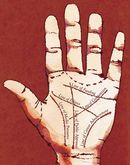 "Of course, scientists have a strong incentive to make bold predictions—namely, to obtain funding, influence, and high-profile publications.
"Of course, scientists have a strong incentive to make bold predictions—namely, to obtain funding, influence, and high-profile publications.
But while few will be disappointed when worst-case forecasts fail to materialize, unfulfilled predictions—of which we’re seeing more and more—can be a blow for patients, policy makers, and for the reputation of science itself." [...]
Sir Ian Wilmut, leader of the Roslin Institute team that cloned Dolly the sheep, says that a “soundbite” media culture that demands uncomplicated, definitive, and sensational statements plays a significant role. “It’s [the media] who put the most pressure on scientists to make predictions,” he says. And in a radio or TV interview that allows perhaps only 10 or 20 seconds for an answer, “it’s very easy then to inadvertently mislead.”
Comment: This article and the quotes I have picked out explains why there is an on going issue with scientific integrity. The comments for the lines on the hand-reading image is quite an insightful depiction.
In praise of the sceptics
ABC.net.au, 30th October 2009
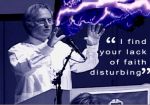
In a speech to the British Association for the Advancement of Science in 1900, the most famous scientist of the day, Lord Kelvin, declared, "Physics is essentially complete".
"There is nothing new to be discovered in physics now," he said. "All that remains is more and more precise measurement."
He did note a couple of "dark clouds on the horizon" but expected they would be erased without much trouble.
One cloud was the puzzle about the constancy of the speed of light; the other how matter absorbed and emitted light. Just five years later Albert Einstein's theories about both would shatter Lord Kelvin's world view.
Einstein wasn't as arrogant as Lord Kelvin. He was to say of his theories, "No amount of experimentation can ever prove me right; a single experiment can prove me wrong".
Comment: I think that Karl Popper has to be one of the greatest scientists for his views on true science, where if a theory could be falsified by experimentation it was science, if it couldn't it was pseudoscience. Many people talk about pseudoscience but they don't have a clue what that actually entails, because most theories are routinely falsified by observation but scientists just update the theory, (like Big Bang & Black Hole theory) and this is not how science should be conducted. Anyway, this article is about scientific scepticism but it starts in a similar vein to the April 2009, Time Magazine's 'Visions of the 21st century', which asked the pertinent question;
Will There Be Anything Left To Discover? Is the great era of scientific inquiry over? Have all the big theories been formulated and important discoveries made—leaving future scientists nothing but fine tuning? Or is the real fun about to begin?
After two science writers debated, the final word on the matter was summarised as follows:
"No matter how far science does or doesn't advance, however, there's one wild card in even the most pessimistic scenario. If we encounter extraterrestrial life—and especially life intelligent enough to have developed its own science—then all bets are off."
It is very important that more people realise that science has not discovered everything. Our world is transforming in front of our eyes and the general public will soon realise that another lifeform lives alongside us. It will be inevitable that many established ideas are going to be have to be radically reconsidered and hopefully, the outcome will be a massive shift in consciousness that will change our world for the better.
What a scientist didn't tell the New York Times about his study on bee deaths
CNN Money, 8th October 2010
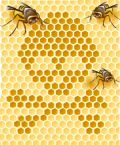
FORTUNE -- Few ecological disasters have been as confounding as the massive and devastating die-off of the world's honeybees. The phenomenon of Colony Collapse Disorder (CCD) -- in which disoriented honeybees die far from their hives -- has kept scientists, beekeepers, and regulators desperately seeking the cause. After all, the honeybee, nature's ultimate utility player, pollinates a third of all the food we eat and contributes an estimated $15 billion in annual agriculture revenue to the U.S. economy.
The long list of possible suspects has included pests, viruses, fungi, and also pesticides, particularly so-called neonicotinoids, a class of neurotoxins that kills insects by attacking their nervous systems. For years, their leading manufacturer, Bayer Crop Science, a subsidiary of the German pharmaceutical giant Bayer AG (BAYRY), has tangled with regulators and fended off lawsuits from angry beekeepers who allege that the pesticides have disoriented and ultimately killed their bees.
Comment: Good article. It seems that we have another scientist that has compromised his research to absolve a major corporation.
Gas mask bra traps Ig Nobel prize
BBC News, 1st October 2009

"Designers of a bra that turns into gas masks and a team who found that named cows produce more milk were among the winners of the 2009 Ig Nobel prizes. The aim of the awards is to honour achievements that "first make people laugh and then make them think". The peace prize went to a Swiss research team who determined whether it is better to be hit over the head with a full or empty bottle of beer. The ceremony was organised by the magazine Annals of Improbable Research."
Comment: What I can't work out is, who agrees to pay for this crazy science?
Science in Turmoil - Are We Funding Fraud?
Thunderbolts.info, 26th September 2009

Inspired by the book:
Against the Tide; A Critical Review by Scientists of How Physics and Astronomy Get Done,
Edited by Martin Lopez Corredoira & Carlos Castro Perelman. (Universal Publishers, Boca Raton, Florida, U.S.A.)
There can be little doubt in the minds of those who are involved in attempting to disseminate research results among the entire scientific community that major problems exist.
It is well documented that adopting certain stances will result in an inability to publish in the majority of the so-called high impact academic journals. There are also well documented cases of people experiencing grave difficulties in their place of work and even, on some occasions, being driven out. Amazingly, there are even cases of attempts being made – some successful – to deny research students their doctorates because their theses contain material which may cause embarrassment for some person with an inflated sense of his/her own importance. Again, more and more academics, certainly in British universities, are coming under increasing pressure to draw funds into their establishments. Note the emphasis is not on good research, or even just research, but rather on attracting more and more money.
[...]
People must read this book! The task may not be easy but it is vitally important for science and, indeed, for humanity, that the information contained is spread abroad to all corners of the Earth. Let the public which ultimately pays the bill, know all the facts and judge accordingly!
For those unable to afford the printed book, a pdf copy of all but one chapter is available
here.
Comment: This article represents the sorry state of academia which controls people via funding. If you don't rock the boat, things will be just fine, if someone has alternative, innovative new ideas, then they become an issue and the scientific history books are full of examples. That is why I stated in the preface to my book that a scientist could be 20, 30, 40 or 50 years ahead in their field and some will die first before they are proven right — eventually. Not being part of the 'in-crowd' and having an alternative view of reality does not mean that you are wrong, maybe you are just way ahead of the curve. The Norwegian Christian Birkeland and the Swedish Hannes Alfvén were scientists many decades ahead of their peers in understanding the electromagnetic properties of space but they were largely ignored — until now, as inclement Space Weather has highlighted the fact that satellite electronics are now being fried by too much electricity in space. It seems that really clever scientists are only appreciated when there is a crisis and mediocrity is not good enough. However, please don't think that it's only scientists that have a rough time. I was shocked to discover that a professor of mythology who co-wrote the iconoclastic 'Hamlet's Mill' was sacked for his opinions. It seems that the analysis and conclusion, that the variation of similar myths that have also been encoded in religious texts all around the world, was to preserve ancient astrological knowledge and this was just too close to the truth. The revelations, to those few who were interested in some enlightenment, required punishment.
Germany: 100 professors suspected of Ph.D. bribes
Yahoo News, 22nd August 2009

"BERLIN – German prosecutors are investigating about 100 professors across the country on suspicion they took bribes to help students get their doctoral degrees, authorities said Saturday.
The investigation is focused on the Institute for Scientific Consulting, based in Bergisch Gladbach, just east of Cologne, which allegedly acted as the intermediary between students and the professors, said Cologne prosecutor's spokesman Guenther Feld.
Feld confirmed reports of the investigation in both Focus magazine and the Neue Westfaelische newspaper, but would not give further details.
The Institute for Scientific Consulting did not answer its phone Saturday.
According to the two publications, students paid between euro4,000 to euro20,000 ($5,700 to $28,500) to the company, which promised to help them get their doctorate degrees through its extensive contacts within university faculties.
The Neue Westfaelische newspaper reported that "hundreds" of students were involved, and that the company paid professors between euro2,000 to euro5,000 when their clients had successfully received their Ph.D.'s. It was not clear whether the students knew that bribes were being paid.
The professors are being investigated on suspicion of fraud, Feld said."
Comment: As academics and especially scientists are often viewed as modern day priests, it is worth noting the many instances where integrity is a major issue.
1 In 7 Scientists Say Colleagues Fake Data
Times Online, 4th June 2009

"Faking scientific data and failing to report commercial conflicts of interest are far more prevalent than previously thought, a study suggests. One in seven scientists says that they are aware of colleagues having seriously breached acceptable conduct by inventing results. And around 46 per cent say that they have observed fellow scientists engage in “questionable practices”, such as presenting data selectively or changing the conclusions of a study in response to pressure from a funding source. However, when scientists were asked about their own behaviour only 2 per cent admitted to having faked results. "
Comment: After finding out about the CMB 'Blackbody' fraud for which the 2006 Nobel prize was awarded, it does seem that NASA did take some action and demoted their Chief Scientist, John Mather. Yet, what was interesting is that the research that was used to prop-up the now seriously in trouble Big Bang cosmology, was not supported by ANY of the first tier European and American universities, who obviously decided to stay clear of the clearly manipulated experiments. Well, I don't believe that we can fully understand the Universe without rigorous scientific theory and experiment/observation. This is now very pertinent as it seems very little thought has gone into the concept of what the 'over-turning of space-time' would mean for the citizen's of planet Earth, but we are now finding out, in a rather ad-hoc manner.
Why cats fail to grasp string theory
New Scientist, 1st June 2009

"Now we know why cats never get bored of
chasing string. A new study has found that domestic felines don't seem to
understand cause and effect connections between objects."
Comment: This
research has got to be a serious candidate to win an IgNobel Prize! But I don't think it's just cats that can't grasp string theory!
Climate Science Fraud at Albany University?
Watts Up with That, 3rd May 2009

"Wei-Chyung Wang is a professor at the University at Albany, State University of New York. He has been doing research on climate for over 30 years, and he has authored or co-authored more than 100 peer-reviewed scientific articles. He has also received an Appreciation Plaque from the Office of Science in the U.S.A., commending him, “For your insightful counsel and excellent science. …”. The plaque resulted in particular from his research on global warming.
I have formally alleged that Wang committed fraud in important parts of his global-warming research. Below is a relevant timeline."
Comment: Hmmm... a whole website on scientific misconduct,
Scientific Misconduct Blogspot . For too long, people just assume that scientists are above reproach and that the peer review system weeds out the fraudsters, but recently, global warming alarmism seems to permit these people to veer well away from any ethical considerations.
How many scientists fabricate and falsify research?
Physorg.com, 29th May 2009

"It's a long-standing and crucial question that, as yet, remains unanswered: just how common is scientific misconduct? In the online, open-access journal PLoS ONE, Daniele Fanelli of the University of Edinburgh reports the first meta-analysis of surveys questioning scientists about their misbehaviours. The results suggest that altering or making up data is more frequent than previously estimated and might be particularly high in medical research."
Comment: It's interesting that there is now quite a lot of talk about integrity in science, especially as we have been informed by metaphysical sources that there will be a polarisation of energies, as people choose which side of the fence they want to sit.
PLANCK SATELLITE AND THE MEDIA LIES
Dreamheron News, 14th May 2009

The European Planck satellite has just been launched. It is designed to observe the universe in a frequency range generally described as the “Cosmic Microwave Background” (CMB) radiation. The Media is a twitter with talk of how Planck will study the early universe. These people do not have the faintest idea whereof they speak.
Folks, if you do not want to follow these Pied Pipers into Stupidville, then understand clearly the following very simple logic: 1. This “early universe” is a figment of imagination within the Big Bang Theory. 2. The Big Bang Theory predicts a microwave background radiation field having a 2.7 K Blackbody Spectrum. 3. The reported verification of this spectrum has now been exposed to be fraudulent. 4. Therefore, the Big Bang Theory is completely bogus.
Comment: See New Scientist article,
Planck: The future of probing the past. Just in case there is the odd physicist who visits this website, this is my first entry from the irrepressible Bibhas De, who is on a campaign for truth in the Physics world. I discovered his wonderful smorgasbord of wit dedicated to the failings of the physics establishment when researching for my book. I was totally intrigued by his belief that there seemed to be a whole world of promise related to plasma and electromagnetism that seemed to be guarded under lock and key from the ordinary physicist. Well, it looks like he has been busy focusing his attention on an experiment that claimed to have discovered the blackbody spectrum from the Big Bang. It seems that his detective work has resulted in
exposing a fraudulent discovery with major implications for a Nobel Laureaute. According to Bibhas De,
"One single person took on the world's almighty physics, astrophysics, astronomy and cosmology establishments, the Nobel establishment, the Media powerhouses and the mighty Government organizations called NASA and OSTP. Together, these communities constitute the highest and the most powerful group of intellectuals in the history of mankind.
Within a year of publication of this site, John C. Mather was indecorously removed from the Chief Scientist post at the NASA Headquarters, and sent back packing to his pre-Nobel job at Goddard Space Flight Center."
This is a clear example of Power vs Force and a total inspiration! What's more, for those interested in technical details, there are a few laughs to be had, but hopefully this exposé may make some consider whether scientific storytelling has become institutionalised.
"Beware of geeks bearing formulas"
William Briggs, 3rd November 2008
 "Those are the words of Warren Buffet, who warned of the coming credit crisis. Buffet—one of the very few—had little faith in the "complicated, computer-drive models systems that many financial giants relay on to minimize risk."
"Those are the words of Warren Buffet, who warned of the coming credit crisis. Buffet—one of the very few—had little faith in the "complicated, computer-drive models systems that many financial giants relay on to minimize risk."
Reader Dan Hughes reminds us of this article in today's Wall Street Journal, which looks at why AIG did so miserably. AIG built a lot of models which attempted to quantify risk and uncertainty in their financial instruments. They, like many other firms, tried to verify how well these models did, but they only did so on the very data that was used to build the models. Now, if you are a regular reader of this blog, you will know that we often talk about how easy it is to build a model to fit any set of data. In fact, with today's computing power, doing so is only a matter of investing a small amount of time."
"What the AIG models failed to account for were the "unknown unknowns" — to use Donald Rumsfeld’s much maligned quotation. They did not quantify the uncertainty of events which they did not know about. They thought that the models quantified the uncertainty of every possible thing that would happen, but of course they did not. Meaning that they were overconfident. AIG's failure is yet another in a long series of lessons that the more complex the situation, the less certain we should be."
Comment: This article is basically about the failure to understand risk and it is quite topical at the moment with the ongoing meltdown of the financial system. I note the reference here to Donald Rumsfeld's hilarious and now famous quote,
"Unknown Unknowns". The subject of risk has been highlighted by
Nassim Nicholas Taleb , the author of "The Black Swan: The Impact of the Highly Improbable", he is now one of my new intellectual heroes, as he was one of only a few voices (crying in the wilderness), stating that economists did not properly understand risk and after 12 years he has now got the world's attention. Sometimes it's a relief to know that there are some serious thinkers out there, who have not sold out for the sake of convenience.... I am also quite taken with the concept of a black swan, it's better than being a black sheep.....
A 60-year-old scandal, an eminent botanist and a plant that was planted
The Scotsman News, 3rd October 2008

"THE discovery of a rare plant on the Isle of Rum in the 1940s led scientists to question whether the Ice Age had ever reached the Scottish isles.
Now, more than half a century later, it has emerged that the man credited with finding the plant had grown it in his Newcastle garden before replanting it in the Inner Hebrides."
Comment: Scientific fraud has always been an issue, even in the nost genteel of the sciences, botany. Here, the article laments why an eminent botanist would "...would waste so much time and effort when botanists have just as much chance of becoming famous by finding real discoveries." The real question is; why would someone want to cause doubt that Scotland had experienced an Ice Age? Maybe, we should consider that this seemingly strange behaviour, as part of ongoing efforts to manipulate the evidence of Earth's true history, which on more than a superficial basis, reveals cycles of change that sometimes bring catastrophe for mankind.
Strippers, armadillos inspire Ig Nobel winners
Physorg.com, 3rd October 2008

"For discovering that, yes indeed, Coke was a spermicide, Anderson and her team are among this year's winners of the Ig Nobel prize, the annual award given by the Annals of Improbable Research magazine to oddball but often surprisingly practical scientific achievements.
The ceremony at Harvard University, in which actual Nobel laureates bestow the awards, also honored a British psychologist who found foods that sound better taste better; a group of researchers who discovered exotic dancers make more money when they are at peak fertility; and a pair of Brazilian archaeologists who determined armadillos can change the course of history."
Comment: The research highlighted by these awards does tend to border on the crackpot, but in the past some highly controversial and serious research has also been given an award, thus tarnishing the reputation of the scientists involved and their cutting edge scientific research.
Top Ten Science Based Predictions that didn’t come true
Watts Up With That, 17th January 2008

"We’ve seen this sort of angst broadcast before, and it occurred to me that through history, a lot of
"predictions of certainty" with roots in scientifically based forecasts have not come true. That being the case, here is the list I’ve compiled of famous quotes and consensus from
"experts".
Comment: Just a reminder that ignorance and arrogance is a potent mixture and history proves so-called "experts" make incorrect assertions over and over again.
Peer Review Not Perfect: Shocking Finding
William Briggs, 12th October 2008
 "The way peer review works is broken, according to a new finding by John Ioannidis and colleagues in their article "Why Current Publication Practices May Distort Science"."
"The way peer review works is broken, according to a new finding by John Ioannidis and colleagues in their article "Why Current Publication Practices May Distort Science"."
"It is true that just because a paper is in a top journal, it is no guarantee that its findings are correct and useful, but I would say that it increases the probability that they are correct and useful.
If you cannot find a journal to take your paper, no matter how atrocious it is, then you aren't trying hard enough."
Comment: The peer review system is corrupt and any scientist wishing to challenge the status quo knows this. Therefore, I have come to the conclusion that anyone who is not a scientist who glibly refers to "fringe science", basically does not have much of an idea about what is going on in the scientific world.
Sword swallowing study wins alternative Nobel prize
Telegraph UK, 4th October 2007

A British radiologist who discovered that sword swallowers suffer "major complications" when they are distracted or while gulping down more than one blade has been awarded an alternative Nobel prize.
Brian Witcombe, a consultant radiologist at Gloucestershire Royal NHS Foundation Trust, has joined the pantheon of scientists whose research on "gay bombs", bottomless bowls of soup, giving jet lagged hamsters Viagra and stranger things besides have been deemed sufficiently quirky to win an "Ig Nobel".
Comment: To be honest, I don't know whether to laugh or cry, 2007 has been a humdinger for the IgNobel Prizes with some stiff competion. How about scientists studying the fate of 46 sword swallowers, who then pontificate with the following gem, "Sore throats are common, particularly while the skill is being learnt or when performances are too frequent." This is also a classic; Harvard University scientists studying how sheets become wrinkled. Meanwhile it's raining 'plasma' diamonds and there is not a peep from any mainstream scientists.
The Ig® Nobel Prizes
Improbable Research, September 2007
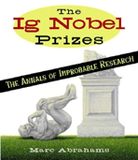 "The Ig Nobel Prizes honor achievements that first make people laugh, and then make them think. The prizes are intended to celebrate the unusual, honor the imaginative -- and spur people's interest in science, medicine, and technology."
"The Ig Nobel Prizes honor achievements that first make people laugh, and then make them think. The prizes are intended to celebrate the unusual, honor the imaginative -- and spur people's interest in science, medicine, and technology."
Comment:
I can't believe Benveniste was awarded an Ig Nobel Prize, for his work which proved cell receptors respond to electromagnetic signals. He emphasised the point by transfering digital signals over the internet and then applied them to cells to trigger biological activity. There does not seem to be any comparison to the following award given in 2006, as below:
PEACE: Claire Rind and Peter Simmons of Newcastle University, in the U.K., for electrically monitoring the activity of a brain cell in a locust while that locust was watching selected highlights from the movie "Star Wars."
REFERENCE: "Orthopteran DCMD Neuron: A Reevaluation of Responses to Moving Objects. I. Selective Responses to Approaching Objects," F.C. Rind and P.J. Simmons, Journal of Neurophysiology, vol. 68, no. 5, November 1992, pp. 1654-66.
WHO ATTENDED THE IG NOBEL CEREMONY: Claire Rind
I think this research deserves the Ig Nobel Prize!
Yo-Yo science and the dangers of coincidence
Junkfood science blogspot, 20 September 2007

"Growing numbers of people are finally getting wise to pop science and those studies that claim something is dangerous one day and healthy the next. The story is bigger than just flaws with the research itself, however, but involves how our minds work — in ways that can lead even experts to be fooled."
Comment: The disillusionment with science is becoming very tangible.
Conference on Integrity in Science Focuses on IPCC
JenniferMarohasy.com Blog, 16th September 2007
 "A claimed "first world conference on research integrity" opens in Lisbon, Portugal, today.
"A claimed "first world conference on research integrity" opens in Lisbon, Portugal, today. The conference media release explains: "The controversies surrounding the recent assessment report of the United Nations' Intergovernmental Panel on Climate Change (IPCC) demonstrates how research integrity is a critical issue not only for the science community, but for politicians and the society as a whole as well."
"Now 350 concerned scientists, scientific managers and magazine editors from around the world are scheduled to attend the event in Lisbon, initiated and organised by the European Science Foundation (ESF) and the US Office for Research Integrity (ORI). It marks a milestone for the science community as it will link all those concerned parties in a global effort to tackle the issue head on."
Comment: The Truth Will Set You Free!
Most Science Studies Appear to Be Tainted By Sloppy Analysis
The Wall Street Journal, 14th September 2007

In a series of influential analytical reports..., in thousands of peer-reviewed research papers published every year, there may be so much less than meets the eye. These flawed findings, for the most part, stem not from fraud or formal misconduct, but from more mundane misbehavior: miscalculation, poor study design or self-serving data analysis.
"There is an increasing concern that in modern research, false findings may be the majority or even the vast majority of published research claims," Dr. Ioannidis said. "A new claim about a research finding is more likely to be false than true."
Comment: All of a sudden, integrity is an issue!
Science should be 'as exciting as science fiction' says Hawking
AFP News, 3rd September 2007

CAMBRIDGE, England (AFP) — British astrophysicist Stephen Hawking revealed his desire on Monday to make "real science as exciting as science fiction" as he publicised a new book for children about the cosmos.
"It is easier to explain things to children because they have open minds and are eager to learn," he told reporters at the prestigious Cambridge University, where he is a professor. [...]
The book was written with his daughter Lucy, who came up with the idea, and Christophe Galfard, the first Frenchman to write a doctorate thesis on Hawking's observations.
"Our aim is to make real science as exciting as science fiction," Hawking said.
Lucy Hawking, a journalist and writer, told the press conference that one of her father's common refrains was, "That's too much science fiction, we do science fact."
Comment: Now that's funny! I think someone needs to tell Hawkins that historically many scientific theories have proven to be science fiction. String theory is now on it's demise, big bang and black holes are going the same way as we realise that we live in a plasma universe. Despite Hawkin's famed black hole hypothesis, other top astrophysicists are starting to realise that black holes are impossible and are now describe them as "bizarre" plasma entities, which is not surprising because plasma makes up 99.999% of the universe. Just perusing the number of websites run by disgruntled scientists, is thought provoking and maybe we need an overhaul of the peer review system that seeks to keep the science fiction in vogue.
The unholy lust of scientists, It may be time to curtail public financing of scientific research
San Francisco Chronicle, January 15, 2006

"In our secular, post-religious society, the figure of the cassock-clad priest has been replaced by that of the white-coated scientist. Dispensing wisdom from the laboratory -- the secular sanctuary -- his every word is awaited breathlessly by a world thirsting for knowledge. [...]
It's all very well having secular shamans, but when they're caught cooking the holy books once too often, the faithful start to get worried. Scientific fraud, like that perpetrated by South Korean stem-cell researcher Hwang Woo Suk, is not new. Newton did it; Dalton did it; even Sigmund Freud did it. In more recent times, IQ researcher Sir Cyril Burt (wanting to show in his studies of twins than genetics trumped environment) committed fraud, as did Australian gynecologist William McBride (he of thalidomide fame).
Comment: This article hits the nail on the head. Science has become a religion and our scientists have become the new clergy and in the pursuit of funding, fame and recognition, scientists are now resorting to scientific fraud. There are many examples, a few are offered in this article. Lies, cheating & fraud are part of the culture, integrity and honesty are in very short supply these days.
Universe 'Could Condense Into Jelly', 6th September 2001
BBC News, 6 September, 2001

"The Universe may be in a state where matter could disintegrate at any moment, a scientist has warned.
But the probability is less than that of buying two lottery tickets in the same week that both win the lottery, said Dr Benjamin Allanach of the European laboratory for particle physics, CERN, in Geneva.
"The fact that the Universe has existed for 15 billion years should tell you it's not likely to happen tomorrow," he told the British Association Festival of Science in Glasgow. "The probability of it happening is tiny."
The idea behind such a catastrophic possibility is supersymmetry. This theory of the Universe states that every particle that makes up matter has a heavier ghostly partner that has similar but not identical properties.
If true, current data implies that the Universe must be perched on an unstable vacuum and "could suddenly condense into jelly and cause this catastrophe", said Dr Allanach.
Ghostly particle
The danger is that a jelly of the ghostly partner of the quark could form spontaneously at any moment, changing the laws of physics of the whole Universe.
Light would stop shining, electricity would no longer work and the matter that makes up us, the Earth and the stars would disintegrate to form a different kind of matter, said Dr Allanach.
This disaster scenario caused some initial nightmares, he said. But further calculations showed that the probability of it actually happening was miniscule, even in a time as long as the age of our Universe.
The actual probability is one in 13 million squared, he said.
Comment: Probably off-topic, but this is a good example of nonsense science. The hilarious comments on this blog, makes up for the claptrap report.







